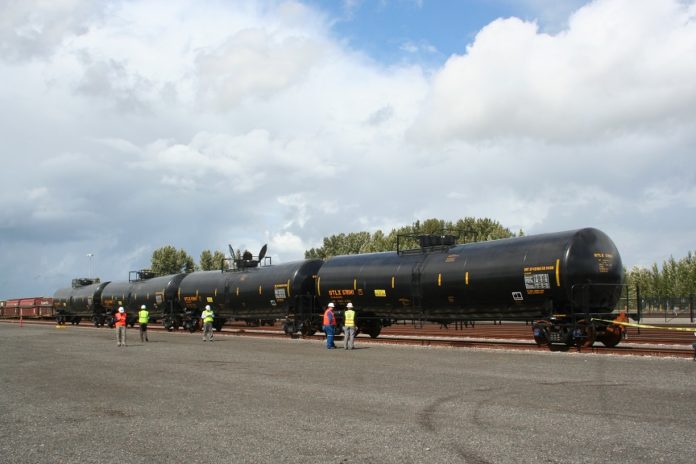Fresh after attending Tuesday night’s public meeting in Ridgefield, where hundreds of citizens weighed in on the proposed oil terminal at the Port of Vancouver, we caught up with Jared Larrabee, vice president and general manager for Vancouver Energy.
In this Q&A, Larrabee discusses the ongoing permitting process, lessons learned from this week’s meeting, the Washington State Energy Facility Site Evaluation Council’s (EFSEC) Draft Environmental Impact Statement, and more.
Q: What was your overall impression of Tuesday night’s public meeting?
Larrabee: The whole purpose of meeting is to give feedback on the Draft Environmental Impact Statement (EIS) and so it’s a good opportunity through the EFSEC process to provide feedback on different items. We knew that was part of the process going in and it’s great to have that.
There was a lot of general commentary about various topics, but there were some specific comments about the Draft EIS as well. We appreciate the need for EFSEC to take that feedback and build it into the final EIS.
Q: Did you learn anything new from the public last night?
Larrabee: It has primarily been a continuation of what we have already been hearing out there. I think one thing we saw that needs to be included more in the EIS is that there are a number of mitigations that we proposed that were not included in the Draft EIS. We think it’s [necessary] that those are included in the future so that people know about all the mitigations that are out there that would actually prevent a number of things that have been talked about.
Q: How do you reflect on the Draft EIS now that you’ve had more time to digest it? Did anything included in it surprise you?
Larrabee: We saw a couple key takeaways. One is that under normal facility operations there are no significant unavoidable impacts. That really demonstrates that a facility like this can be built and operated in a safe and environmentally responsible way. A second one is they (EFSEC) highlight that if this facility is not built, the demand is still there on the West Coast for transportation fuels and, therefore, for the oil coming from the mid-continent of the United States. They indicate that there still will be that product moving through the area, primarily by rail.
Q: You mentioned mitigations earlier. Are there mitigations proposed by EFSEC that Vancouver Energy would not be willing to address?
Larrabee: There are a number of mitigations that EFSEC has recommended and we are in the process of evaluating them and going through that list to see if, one, they make sense, and two, if that is the right way to address it or if there are other ways. So we are in the process of doing an evaluation of those right now.
Q: Will the length of this permitting process at some point affect the lease with the Port of Vancouver? Or could it create situation where Vancouver Energy considers alternative sites?
Larrabee: What I can tell you is that this is the option we are focused on. We are not looking elsewhere because we do believe it is the best that is out there.
As it relates to the lease and the timelines, I think that what you have seen is a trend; there’s a significant amount of economic development out there that is tied up in permitting processes right now. The longer that land gets tied up, it can’t be used for other things and it can’t be used for what it is being permitted for. You have projects waiting for the economic development to come and waiting for the permitting processes to complete. So in doing their review, we believe EFSEC must strike a balance being thorough with being timely.
Q: Would you like to see more local business associations come forward with an official position on the proposed terminal? Does that matter?
Larrabee: Yes, we would like to see that. We do think it is important for the business community to share their voice and their views as it relates to this. Partially because in the absence of that, then that void is filled by others. It is important for businesses to share their perspectives.
Q: What about a group like Vancouver 101 – the coalition of small businesses that say this project will ultimately result in job losses?
Larrabee: By their own admission, that is a back-of-the-napkin calculation and the Draft EIS includes an analysis of the net job impact, which is overwhelmingly positive. A lot of the numbers we discuss all the time come from that analysis. Frankly, I don’t think they (Vancouver 101) have provided any analytical support that says there is any merit to [their job loss claims].
Q: With the next public meeting coming up on January 12, do you have any thoughts on the nature of the conversation that is playing out?
Larrabee: I think the EFSEC process is designed to be a process that is fact-based and robust. We do see that when there is heavy emotion involved it tends to move away from that discussion of the facts. For the most part, when we talk to people on an individual basis, we can have great discussions on how we move forward.
I do think as citizens there is nothing that says we shouldn’t share our views and have an opportunity to voice our opinions, but we also have a responsibility to be civil in our discussions and I think for the most part that has happened, despite what is sometimes portrayed in the media.
The evaluation council will finalize its Environmental Impact Statement and make a recommendation to Gov. Inslee, who has the final say on the project. To submit public comments to EFSEC online, visit www.efsec.wa.gov.








